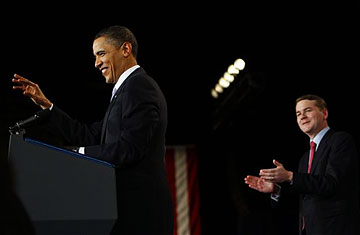
President Barack Obama, left, and Senator Michael Bennet at a fundraiser for Bennet at the Filmore Auditorium in Denver on Feb. 18, 2010
President Obama left the chill of Washington on Thursday to stump for a pair of ailing Democratic Senators in Western battleground states. In Denver, Obama flexed his fundraising muscles at a pair of events for Senator Michael Bennet of Colorado before heading to Nevada, where Senate majority leader Harry Reid is locked in a bitter contest. Democrats are hoping the sojourn, which comes on the heels of Indiana Senator Evan Bayh's surprise announcement that he will not stand for re-election this fall, will bolster the campaigns of two vulnerable candidates whose races could be key in preserving the party's Senate majority, an edge that appears increasingly fragile.
But with Americans of all stripes dismayed by the legislative paralysis that's gripping the capital, some are beginning to question whether Obama's presence on the campaign trail will help or hinder Democratic candidates. Richard Blumenthal, the Connecticut attorney general who is running for the state's U.S. Senate seat, offered a tepid appraisal when asked recently if he expected Obama to campaign for him. "I don't know whether he would and I don't know whether we would ask. At this point, it is an open question," Blumenthal told students at Yale University in New Haven. Last month, red-state Republican operatives sounded giddy about the prospect of an Obama visit. "The Democrats can't run away from the position of their party; they can't run away from their President," Chris Devaney, chairman of the Republican Party in Tennessee, told Politico. "I'd welcome President Obama anytime."
Despite recent Pew and CNN/Opinion Research polls in which 49% of respondents said they approved of Obama's performance, the President remains a more popular figure than either party as a whole. Nor is there any question that he retains an unparalleled ability to pry open checkbooks. But analysts are beginning to wonder whether his endorsement is still a game-changing asset. In recent statewide races in New Jersey, Virginia and Massachusetts, "vigorous efforts by Obama could not produce the Obama surge with voters at the polls," says Larry Sabato, director of the Center for Politics at the University of Virginia.
Still, Sabato cautions that "sometimes, we're too quick to draw conclusions from two or three data points." He notes that in Colorado, where Bennet is fighting a primary challenge from former Colorado house speaker Andrew Romanoff, Obama has the potential to kindle a groundswell of grass-roots support. Bennet was appointed to the seat last year, when Obama tapped former Colorado Senator Ken Salazar to join his Administration as Secretary of the Interior. A recent poll put Bennet 14 percentage points behind in a potential matchup with Republican candidate Jane Norton.
But where Democrats see the President's visit as a way to build Bennet's network, opponents are working to tether the candidate to a President who looms as the most visible face in a virulently anti-incumbent cycle. "I think it's mixed," says Celinda Lake, a Democratic pollster whose firm is working for Romanoff. "He brings a lot of publicity and attention, but he makes you kind of the insider candidate."
On the eve of the President's visit, Norton ran a negative ad lambasting the Obama Administration for excessive spending. "We wanted to take advantage of this opportunity of the President coming to town to really make a point that the spending has to stop, the debt has to come down, and that the government health care takeover needs to be shelved," says Nate Strauch, Norton's press secretary, who says Bennet's policies are "in lockstep" with the President's. In remarks at a Denver auditorium, Obama sought to position Bennet as an anti-establishment political neophyte. "Even though Michael Bennet has been serving you for years, believe it or not, this is his first election," Obama told a buoyant crowd. "He's a heck of a public servant, but he's new to politics, so he hasn't learned the best way to keep your poll numbers up is just to smile and wave and pretend like you're doing something and not really doing anything that might offend anybody; he hasn't perfected the seven-second sound bite. He's never even made a TV ad."
By contrast, Reid — a veteran with ample name recognition who is lagging in his race for re-election — "is going to rise and fall on his own," says Sabato. "Appearances by Obama probably won't make much difference." But Obama probably isn't helping; he recently irked Nevada natives by warning Americans not to spend precious dollars on a trip to Las Vegas — a cutting criticism for a city whose lifeblood is tourism. Opponents seized on the remark. Danny Tarkanian, the son of former UNLV basketball coach Jerry Tarkanian and one of Reid's potential Republican opponents, dubbed the meeting between the President and the majority leader a "socialism summit."
While the Western swing comes early in the campaign cycle, White House press secretary Robert Gibbs told reporters aboard Air Force One that the timing shouldn't be a surprise. "They are very competitive states, as they were just two years ago. The political landscape not just in these two states but throughout the country continues to be dominated by concern about the economy, not surprisingly," Gibbs said. With the Administration devoting considerable energy to hailing the success of its economic stimulus package, it's clear that Obama's team considers the economy the fulcrum on which the midterms pivot. "At the end of the day," says Democratic Senate Campaign Committee spokeswoman Deirdre Murphy, "it's going to come down to whether they want to go with Democrats who have produced steady economic progress or go with Republicans whose failed policies got us into this mess in the first place."
